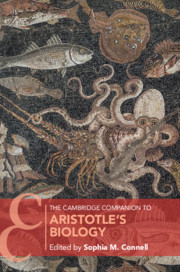Book contents
- The Cambridge Companion to Aristotle’s Biology
- OTHER VOLUMES IN THE SERIES OF CAMBRIDGE COMPANIONS
- The Cambridge Companion to Aristotle’s Biology
- Copyright page
- Contents
- Figures
- Contributors
- Abbreviations
- Introduction
- Chapter 1 Biology and Theology in Aristotle’s Theoretical and Practical Sciences
- Chapter 2 The Presocratics, Plato, and Aristotle’s Biology
- Chapter 3 Aristotle’s Biology and Early Medicine
- Chapter 4 Empiricism and Hearsay in Aristotle’s Zoological Collection of Facts
- Chapter 5 Parts of Animals Book 1 on Methods of Inquiry
- Chapter 6 Teleological Perspectives in Aristotle’s Biology
- Chapter 7 Aristotle’s Biological Metaphysics
- Chapter 8 Life-Cycles and the Actions of Nutritive Soul in Aristotle
- Chapter 9 Aristotle on Animal Generation and Hereditary Resemblance
- Chapter 10 The Science of Perception in Aristotle
- Chapter 11 Aristotle’s Theory of Animal Agency and the Problem of Self-Motion
- Chapter 12 Animal Cognition in Aristotle
- Chapter 13 Elements of Biology in Aristotle’s Political Science
- Chapter 14 The Early Reception of Aristotle’s Biology
- Chapter 15 The Reception of Aristotle’s Biology in Late Antiquity and Beyond
- Chapter 16 Aristotelian Teleology and Philosophy of Biology in the Darwinian Era
- Chapter 17 Aristotle and Contemporary Biology
- Afterword: Philosophical Issues in Aristotle’s Biology – Its Coming-to-Be and Its Being
- Bibliography
- General Index
- Index Locorum
- OTHER VOLUMES IN THE SERIES OF CAMBRIDGE COMPANIONS
- References
Chapter 3 - Aristotle’s Biology and Early Medicine
Published online by Cambridge University Press: 14 May 2021
- The Cambridge Companion to Aristotle’s Biology
- OTHER VOLUMES IN THE SERIES OF CAMBRIDGE COMPANIONS
- The Cambridge Companion to Aristotle’s Biology
- Copyright page
- Contents
- Figures
- Contributors
- Abbreviations
- Introduction
- Chapter 1 Biology and Theology in Aristotle’s Theoretical and Practical Sciences
- Chapter 2 The Presocratics, Plato, and Aristotle’s Biology
- Chapter 3 Aristotle’s Biology and Early Medicine
- Chapter 4 Empiricism and Hearsay in Aristotle’s Zoological Collection of Facts
- Chapter 5 Parts of Animals Book 1 on Methods of Inquiry
- Chapter 6 Teleological Perspectives in Aristotle’s Biology
- Chapter 7 Aristotle’s Biological Metaphysics
- Chapter 8 Life-Cycles and the Actions of Nutritive Soul in Aristotle
- Chapter 9 Aristotle on Animal Generation and Hereditary Resemblance
- Chapter 10 The Science of Perception in Aristotle
- Chapter 11 Aristotle’s Theory of Animal Agency and the Problem of Self-Motion
- Chapter 12 Animal Cognition in Aristotle
- Chapter 13 Elements of Biology in Aristotle’s Political Science
- Chapter 14 The Early Reception of Aristotle’s Biology
- Chapter 15 The Reception of Aristotle’s Biology in Late Antiquity and Beyond
- Chapter 16 Aristotelian Teleology and Philosophy of Biology in the Darwinian Era
- Chapter 17 Aristotle and Contemporary Biology
- Afterword: Philosophical Issues in Aristotle’s Biology – Its Coming-to-Be and Its Being
- Bibliography
- General Index
- Index Locorum
- OTHER VOLUMES IN THE SERIES OF CAMBRIDGE COMPANIONS
- References
Summary
In this chapter I introduce the thesis that Aristotle’s biology was considerably influenced by medical tradition as represented by the so-called Hippocratic writings. I start with a brief discussion of the history of the debate and the state of investigation and introduce the main advocates as well as opponents of the thesis. I then focus on Aristotle’s remarks on distinguished physicians and the relationship between medicine and natural philosophy in Parva Naturalia. With the help of selected passages from the Hippocratic On Regimen, On Flesh and On Ancient Medicine I make the case that Aristotle reflects upon a specific medical debate on the first principles of human (and animal) physiology and clarifies his own position in it, namely that he takes sides with those physicians who practice their discipline “in a more philosophical manner” and who employ heat, cold, and other such qualities as the starting points of their physiological explanations.
- Type
- Chapter
- Information
- The Cambridge Companion to Aristotle's Biology , pp. 46 - 63Publisher: Cambridge University PressPrint publication year: 2021



